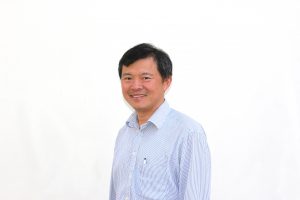
Speaker: Abraham Lee, Ph.D.
Affiliation: Department of Biomedical Engineering, UCI
Microfluidic Circulatory System for Biomedicine
Over the last 25 years, microfluidics has gone from a nascent hype with tremendous expectations through a period of underachievement and disappointments, to the current state of steady investment and ever increasing solid confidence. In my opinion, microfluidics is entering its golden age as the technology has matured to the point that most of the risk in determining whether a technology can make it to become viable product lies in its application and business strategy, and not in the feasibility of the technology. For biomedicine, there are several promising clinical applications that are relying on microfluidics technologies as the enabling technology. Examples of these applications are liquid biopsy, single cell analysis, genotyping/sequencing, organ-on-a-chip, and cell-based therapy. From a holistic health stand point, biomedicine has the goal of maintaining the balance of the physiological functions, and the most basic physiological system is the circulatory system. Thus the most basic function is the transport of liquid (predominantly blood) through this system, and therefore sampling, processing, analyzing, and recapitulating these liquid fluids and its components is the utmost function of medicine, and this is where microfluidics is making profound impact.
In this talk, I will focus on two aspects of using microfluidics to probe and process the circulatory system. The first is related to liquid biopsy, where my lab is developing technology to process blood and separate, enrich and analyze blood and its constituents. This advent of microfluidic liquid biopsy provides an in vitro snap shot into the patient’s physiological status via the in vivo circulation that enables one to monitor disease state and progression for diagnosis and prognosis. Liquid biopsy has become a promising technology to isolate and target rare cells such as circulating tumor cells (CTCs) in body fluids thanks to many of these microfluidic cell sorting techniques. The second technology that I will highlight from my lab is related to the development of microphysiological systems and organ-on-a-chip for drug screening and regenerative medicine. Over the years, drug screening has mostly been carried out on 2D monolayers in microwell plates and the drugs screened are not delivered through blood vessels as they are for in vivo treatments. Through the advancement of microfluidics technologies, and in collaboration with two of my colleagues, our team has developed a perfused vascularized 3D micro tissue, with drugs or biological fluids delivered through microfluidic channels that are “anastamosed” with the capillary network in the micro tissue. This vascular network mimics the physiological circulation of the human body on-chip. The critical bottleneck is to engineer the microenvironment for the formation of 3D tissues and organs and to also pump and perfuse the tissue vascular network for on-chip in vitro microcirculation. Microfluidics play an important role in both the above-mentioned in vivo liquid biopsy and in vitro physiological circulation platforms. These two technologies will go hand-in-hand to connect in vitro screening to in vivo treatment with tremendous potential towards the realization of personalized medicine.
Biography:
Abraham (Abe) P. Lee is the William J. Link Professor and Chair of the Biomedical Engineering (BME) Department with a courtesy appointment in Mechanical and Aerospace Engineering (MAE) at the University of California, Irvine. He is the Director of the NSF I/UCRC “Center for Advanced Design & Manufacturing of Integrated Microfluidics” (CADMIM) and also was PI for the Micro/nano Fluidics Fundamentals Focus (MF3) Center, a DARPA-industry supported research center (2006-2013). Dr. Lee started his appointment as Editor-in-Chief for the Lab on a Chip journal in January 2017 (leading journal in his field). Prior to joining UCI in 2002, he was a Senior Technology Advisor in the Office of Technology and Industrial Relations at the National Cancer Institute (NCI), and a program manager in the Microsystems Technology Office of the Defense Advanced Research Projects Agency (DARPA). Dr. Lee started his career at Lawrence Livermore National Laboratory and led projects on the development of microtools for the treatment of stroke and biodefense. Dr. Lee’s lab focuses on microfluidic platforms applied to point-of-care and molecular diagnostics, sample preparation and liquid biopsy, cell-like vesicles for theranostics, single cell processing and analysis, and vascularized organ-on-a-chips. His research has contributed to the founding of several start-up companies and he serves as an advisor to companies and government agencies. He owns more than 40 issued US patents and has published more than 100 journal articles. Professor Lee was awarded the 2009 Pioneers of Miniaturization Prize and is an elected fellow of the American Institute of and Medical and Biological Engineering and the American Society of Mechanical Engineers. Dr. Lee received his Ph.D. from UC Berkeley and his B.S. degree from National Tsing Hua University.
Date/Time:
Date(s) - Nov 08, 2017
1:00 pm - 2:00 pm
Location:
Engineering V, Room 2101
410 Westwood Plaza Los Angeles CA 90095
